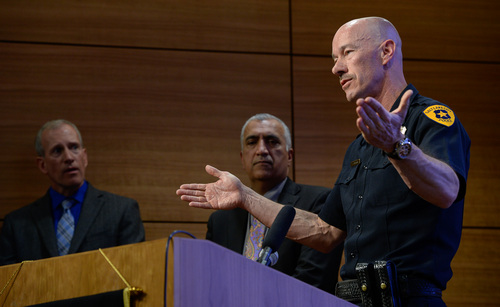This is an archived article that was published on sltrib.com in 2014, and information in the article may be outdated. It is provided only for personal research purposes and may not be reprinted.
The Salt Lake City Police Department was conspicuous by its absence Tuesday evening as the City Council began chewing over in earnest its concerns with rape investigations and officer-involved shootings.
Among other things, the council sought more transparency from the police department.
"We need the chief [Chris Burbank] to be less tone deaf on this," said Councilman Luke Garrott.
Police Chief Chris Burbank was out of town and none of his top policy subordinates were available, according to David Everitt, chief of staff to Mayor Ralph Becker.
But Council Chairman Charlie Luke said he wasn't worried that the police department was not in attendance. "This was a chance for the council to discuss these issues among ourselves."
Previously, police officials have said they wanted to be involved in any discussion concerning the department's protocols.
Among other things, the council wondered what and how much training police officers are receiving in instances that require deadly force as well as initial contact with reported victims of sex assault.
On Aug. 11, 20-year-old Dillon Taylor was shot and killed by Salt Lake City police officers outside a 7-Eleven store. South Salt Lake is investigating the incident.
On June 18, police entered a fenced backyard searching for a reported missing child and shot dead a 2-year-old dog named Geist.
"The public is getting no information on officer-involved shootings," Garrott said. "The public doesn't deserve swift justice, but it does deserve a transparent process. Transparency would do a lot of good so the public thinks the process is legit."
The council agreed to seek more information from the chief regarding deadly-force training and what might be done to enhance it.
The subject of investigation of sex assault was more complex. Councilman Kyle LaMalfa introduced a multi-pronged approach that includes testing all Code R, or rape kits, containing forensic evidence. Of 1,001 rapes reported in Salt Lake City between 2003 and 2011, 788 rape kits from those investigations went untested.
Burbank has said testing all kits is unnecessary and he faulted the State Crime Lab for not being able to process them in a timely fashion.
This kits cost anywhere from $1,100 to $1,500 to process.
In a nonbinding straw poll, the council voted to test all backlogged kits and all kits from reported sex assaults going forward.
It also will ask the Becker administration for ideas on how to fund the testing.
Police department data reveals that between 76 to 147 sex assaults are reported each year. Councilwoman Lisa Adams said allocating $120,000, or so, each year "to give the victim piece of mind is a bargain."
Garrott added: "Our goal is to serve justice no matter what the cost."
The council also approved in a straw poll the proposal to hire an outside expert to analyze the police department's training regarding sex assault investigations.
LaMalfa also suggested an audit of the backlogged rape cases to determine the success of the police department's protocols.
In addition, the council directed its staff to research the feasibility of using a private lab for the forensic analysis and whether partnering with other municipalities was feasible.
In a separate effort, an ad hoc work group made up of officials from various private and public sector entities in concert with the state Commission on Criminal and Juvenile Justice is devising a plan to prioritize and analyze some 2,500 backlogged rape kits statewide.
The Utah Legislature earlier this year allocated $750,000 for analysis of those kits – enough funding for about 700 of the total.
Luke said the city would move forward with its own program with the expectation that state funding would not meet all of Salt Lake City's needs.



